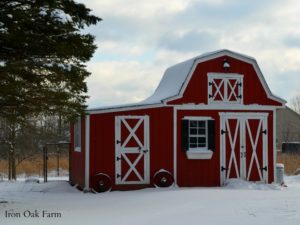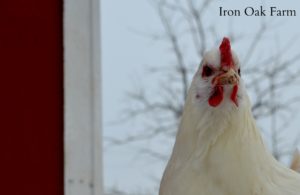Egg are Seasonal
If you’re new to raising chickens you might not realize that chickens do not naturally lay an egg every day, year-round. In the late summer/early fall you might notice that your hens stop laying altogether. You might also notice that your coop is littered with feathers. This is the seasonal molt where your chickens will shed their feathers and grow new ones so they have nice full plumage to protect against the winter cold.
Your hens will stop laying during this time because they are using nutrients and energy to grow their feathers back. Often, the molt will carry into the beginning of winter and you may not see eggs again until spring.
Why do they stop laying?
In nature, it would not be productive for a chicken to raise young through the winter months. Most likely the chicks would freeze before they feathered over even with mamma hen sitting on them. Also, there is less food available for young birds.
How do they know cold weather is coming?
 The signal to molt and stop for winter egg production has less to do with the cold temperatures and more to do with the number of daylight hours. Birds are very sensitive to exposure to daylight. As the days start to get shorter this triggers a natural instinct to stop laying. This signal is the same one that tells migratory birds to start heading south.
The signal to molt and stop for winter egg production has less to do with the cold temperatures and more to do with the number of daylight hours. Birds are very sensitive to exposure to daylight. As the days start to get shorter this triggers a natural instinct to stop laying. This signal is the same one that tells migratory birds to start heading south.
How can I get more eggs?
Add a light
The best thing to do to keep your hens laying through the winter is to provide extra light in the coop. Adding a light on a timer will provide your hens with additional “daylight hours” and trick them into laying more eggs.
The total hours of daylight should average 14-15 hours to keep your hens in high production.
This light is best provided in the morning so that it doesn’t confuse your chickens roosting instinct.
The Coop
 If you don’t have your coop built already, there are a few design elements that will help with winter production.
If you don’t have your coop built already, there are a few design elements that will help with winter production.
- Face the opening to your run to the south. This will allow the warmest part of the sky to beat on your entrance. It will also provide the most sun exposure.
- Insulate your coop well and provide upper ventilation. This will keep the coop warm but will allow moisture and odors to escape.
- Arrange your roosts so your chickens can huddle closely for warmth and to keep the coop temperature up at night.
Start with laying breeds
 If you don’t have chickens yet or are looking to add a few more, breeds like Leghorn, Golden Comet or Plymouth Rock are good choices. These chickens are already egg-laying champions so your chances of getting them to produce through the winter months are in your favor.
If you don’t have chickens yet or are looking to add a few more, breeds like Leghorn, Golden Comet or Plymouth Rock are good choices. These chickens are already egg-laying champions so your chances of getting them to produce through the winter months are in your favor.
Water
An egg is about 75% water so chickens will only lay if they are well hydrated. Even being without water for a couple hours can throw off their egg-laying cycle. Providing fresh, liquid water can be challenging in freezing temperatures. The best way to keep water from freezing is to provide a heated waterer. There are many designs available including those with thermostats that only turn on when the temperature drops below 32 degrees. Otherwise, plan on making several trips out to your coop to provide unfrozen water.
Feed
Feeding a quality layer feed with the right balance of protein and calcium will help your chickens to lay consistently. Adding an additional protein source can help also. Your chickens are fighting to keep their bodies warm and to lay eggs so extra protein can be beneficial. You can mix in a grower feed at about 5-10% with their regular layer formula.
Also, while treats like scratch may be fun for your chickens in the boredom of winter, they can negatively impact egg production because of their low nutrient content.
Supplements
Experimenting with supplements can also help egg production. Adding garlic to the feed can help fight against seasonal respiratory infections. I’ve also noticed that seabuckthorn helps increase egg production. You should also offer calcium-free choice in the form of crush eggshells or oyster shells.














5 Comments
How long will it take a egg to freeze when temp is between 15 and 20 degrees?
I have Easter Eggers, and they started laying at 26 weeks, in the middle of an early October snow! I have lovely turquoise eggs almost every day, which is a surprise. But I have always fed my chickens some greens, specifically spinach, every winter, with sunflower seeds and other natural treats, in addition to usual feed. In summer, I scour the land for dandelions and clover too. The coop run faces SE, gets sun all day, is insulated and has a heat light. We get below zero a lot, and gale force winds. In winter, I attach those corrugated plastic roof panels along the side of the run for wind. In summer, those come off and I have shade cloth. I do make sure the water is fresh and free of ice, but I am home, and someone who isn’t should get a heated waterer. Heated dog bowls are perfect.
Have trouble with big hawk killing chickens sometimes they will be eaten and sometimes it seem they kill for sport what can i do appreciate any help
If you can put netting over your chicken run, that will limit hawk access to your chickens.
I use olastic conduit and weld wire for my run and those pesky hawks BOUNCE when they dive in for a chicken lunch! Weld wire all the way!